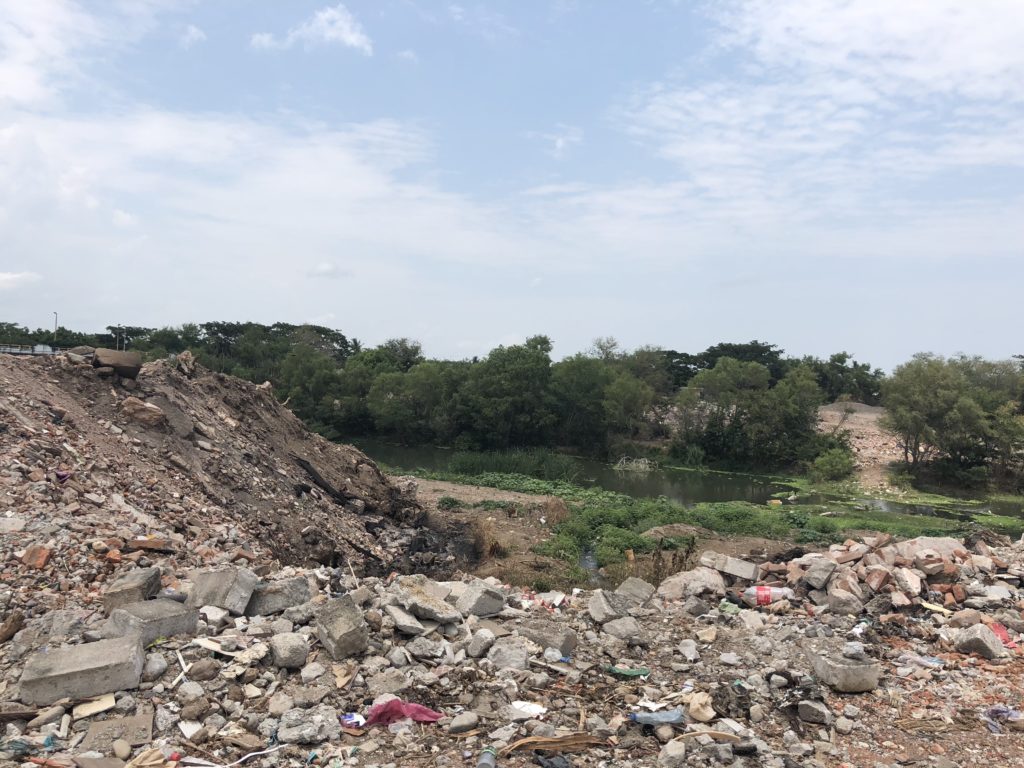Disaster as an Opportunity: Alternatives for Debris Management at the Las Nutrias Riverbank in Oaxaca, Mexico
Dení López | Nadyeli Quiroz | Betzabe Valdés | Marisa Villareal
Bisa’bi nga ra guiigu’ (If something is useless, throw it to the river) – Popular Zapotec saying
Our site investigation will study the seismic and floodable urban area along the Las Nutrias (Guigu Bicu Nisa) riverbank in Oaxaca, comprised by five Zapotec municipalities: Ciudad Ixtepec, Asunción Ixtaltepec, El Espinal, Juchitán de Zaragoza, and Santa María Xadani. Following the devastating earthquakes of September of 2017, Asunción Ixtaltepec’s riverbank became a humongous, improvised, and unprotected rubble dumpsite to serve as a barrier against periodic floods. Sadly, it was the municipality with the most unambiguous debris management initiative, and it completely disregarded potential environmental damage or future strategies for rubble management. The rest of the towns spread mounts of waste construction material along streets, “temporary” dump sites, and their corresponding (and already heavily polluted) riverbank. Nine months later, there is still a long way to go regarding demolition and rubble discard, and no one is thinking about implementing a better scheme.
Our goal is to create a new narrative that integrates bottom-up and technical knowledge to inform the medium and long-term reconstruction and development process along this rural-urban corridor. To create a holistic strategy that looks beyond housing provision, we will focus on studying the use, misuse, characteristics, alternatives, and intersections regarding the built and natural environment, public space, waste management, and cultural identity. We will conduct a community needs survey, a thorough mapping and ecological study, a series of creative mapping workshops, and detailed interviews with key actors within and outside the local population (such as government agencies, academic institutions, non-profit organizations, and private-sector enterprises). As students, we recognize our responsibility to gather, generate and share objective and neutral information to foster cross-scalar dialogue that leads to sustainable actions. We will create and distribute a digital information repository, a video, and a booklet to hopefully spark integrative conversations about recovery and forge new partnerships.
This research, funded by the Penny White Project Fund, the David Rockefeller Center for Latin American Studies, and the International Community Service Fellowship will initiate our year-long thesis and set a precedent for a different kind of preemptive intervention in areas. We will map prospective rubble deposits, understand the towns on the riverbank along with their pre-and-post disaster underlying power structures, and comprehend the type of proposal that could strengthen the local sense of place. We intend to develop an environmentally conscious project-based plan and incremental action that serves as a foundation to deal with inevitable upcoming disasters and negotiates between the people, institutions, and other development experts. In other words, we see this as the first step to create a comprehensive flood-control project and community-led public space along the river.





